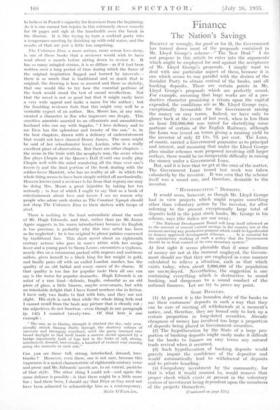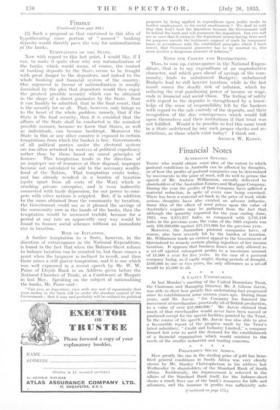Finance
The Nation's Savings
RIGHTLY or wrongly; for good or for ill, the Government has turned down most of the proposals contained in Mr. Lloyd George's seheme—" The New Deal." I do not propose in this article to enter into the argumentS' which might be employed for 'and againd the acceptance of. Mr. Lloyd George's proposals. I simply want to deal with one particular aspect of them, because •it one which seems to run parallel with the desires of the Socialist Party to obtain control of the banks, and all banking deposits., There are certain points . in MA'. Lloyd George's proposals which are perfectly sound., For example, assuming that large works are of a pro- ductive character promising a return upon the capital expended,' the 'conditions are as Mr.' Lloyd George says, exceptionally favourable for the Government raising the money on easy terms. Indeed, we have only to glance back at the event of last week, when in less than an, hour. £82,000,000. was raised for electrifying some portions of certain of the English Railways, although the Loan was issued on terms giving a running yield to the investor of only £2 Hs. 7d. per cent. The Loan, of course, carried .a. Government guarantee as to principal and interest, and assuming that under the Lloyd George plan similar schemes were proposed involving still larger outlays, there would beno insuperable difficultY in 'raising the money under a Governthent Loan. But, and it is here that we get at the crux of the matter. The Government Loan issued last week was taken voluntarily by the investor. It was seen that the scheme itself was a sound one, and therefore, desirable to the investor.
. HYPOTHECATING 1 PEpoms.'
It would seem, however, as though Mr. Lloyd George had in view projects which might require something other than voluntary action by the investor, for after referring to' the' present exceptionally large total of deposits held in the joint stock banks, Mr. George in his scheme, says (the italics are our own) : ." The National Development Board will keep itself informed as to the amount of unused current savings in the country not at the moment serving any productive purpose which could be hypothecate c to finance approved development. schemes. . . . It is essential for the .satisfactory working of such a policy that the Government should be in final control of its own monetary system."
At first sight it seems plausible that if some millions of money are not at the moment employed, the Govern-. ment should see that they are employed in some manner calculated to relieve a situation, such as that which exists today, when about 2,004,000 of the population are uncrOloyed. .Nevertheless, the suggestion is one . containing everything which is destructive to sound banking, and dangerous to a sound conduct of the national finances. Let me try to prove my point.
S•(1). At present it is°tmhE DANGERS. e bounden duty of the 'banks to use their customers' deposits in such a way that they can be sure. of meeting • all, withdrawals at a moment's notice, and, therefore, they are bound only to lock up a certain proportion in long-dated securities. Already cheapness- of money has involved too large n proportion • of deposits being placed in Qovernment. securities. (2) The hypOthecation by the State of a large pro- portion of banking deposits might easily make it difficult for the banks to finance on easy terms any natural trade revival when it occurred. .
(8) Such hypothecation of banking deposits would gravely impair the ,confidence ,of the depositor and would automatically lead to withdrawal of deposits and to private hoarding. (4) CoMpulsory investment by the community, for that is what it would amount to,' would remove that • proper check which exists at present in the voluntary system of investment being dependent upon the soundness of the projects themselves. '(Continued on 'page 170.) •
Finance
(Continued from page 168.) (5) Such a proposal as that contained in this idea of hypothecating some portion of " unused " banking deposits would directly pave the way for nationalization of the banks.
TEMPTATIONS OF THE STATE.
Now with regard to this last point, I would like, if I can, to make it quite clear why any nationalization of the banks, which would mean, of course, the control of banking deposits by the State, seems to be fraught with great danger to the depositors, and indeed to the whole banking and financial system of the country. One argument in favour of nationalization is usually furnished by the plea that depositors would then enjoy , the greatest possible security which can be obtained in the shape of a direct guarantee by the State. Now it can frankly be admitted, that in the final resort, that is the security for us all, That, however, only brings us to the heart of the whole problem, namely, that if the State is the final security, then it is essential that the affairs of the State shall be conducted in the soundest possible manner, because we know that States, as well as individuals, can become bankrupt. Moreover the State in this or any other country is exposed to certain temptations from which the banker is 'free. GoVernments of all political parties under the electoral system are too often actuated by motives of political expediency rather than by those based on sound principles of finance. This temptation tends in the direction of an improper use of resources at their disposal, improper because not calculated to add to the necessary wealth- fund of the Nation. That temptation exists today, and has already resulted in a burden of taxation (quite apart from all costs of the War) which is crushing private enterprise, and is even indirectly connected with trade depression, for our power to com- pete with other nations is crippled. But, if in addition to the sums obtained from the community by taxation, the Government could use as it pleased the savings of the community now in the hands of the banks, then the temptation would be increased tenfold, because for a period at any rate an apparently easy way would be found to finance social schemes without an immediate rise in taxation.
RISK OF INFLATION.
A further temptation to a State, however, in the direction of extravagance in the National Expenditure, is found in the fact that'when the Balance-Sheet refuses to balance taxation can be resorted to, but there comes a point when the taxpayer is inclined to revolt, and then there arises a still graver temptation, and it is one which was well expressed in a recent speech by Mr. W. W. Paine of Lloyds Bank in an Address given before the National Chamber of Trade, at a Conference at Margate in last May. Speaking on the subject of nationalizing the banks, Mr. Paine said :
" Can you, as depositors, view with any sort of equanimity that Your money in the bank will be under the absolute control of the Government ; that it may and probably will be utilized for political
purposes by being applied in expenditure upon public works to further employment, or for social amelioration I We shall be told that that won't hurt the depositors because the Government will be behind the bank and will guarantee the depositors. But you will see at once that if, owing to the depositors' money having been used for purposes outside the legitimate support of trade by temporary loans in accordance with the established principles which I have stated, that Government guarantee has to be resorted to, this must involve a dangerous measure of inflation."
NEED FOR CHECKS AND RESTRICTIONS.
Thus, to sum up, extravagance in the National Expen- diture, that is to say expenditure of an unproductive character, and which goes ahead of savings of the com- munity, leads to unbalanced Budgets ; unbalanced Budgets lead to still heavier taxation, while in the last resort comes the deadly risk of inflation, which by reducing the real purchasing power of income or wage, ends in financial and social chaos. The feeling of safety with regard to the deposits is strengthened by a know- ledge of the sense of responsibility felt by the bankers with regard to the safe custody of the deposits, and their recognition of the dire consequences which would fall upon themselves and their institutions if that trust was not fulfilled. Would it be possible to feel this same trust in a State unfettered by any such proper checks and re- strictions, as those which exist today? I think not.
ARTHUR W. KIDDY.






































 Previous page
Previous page